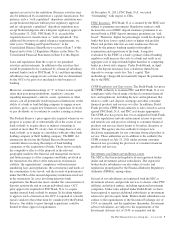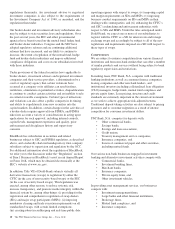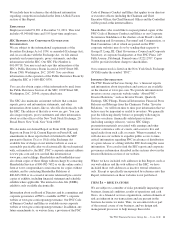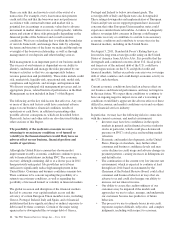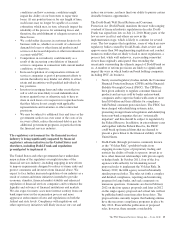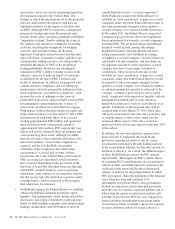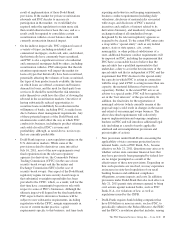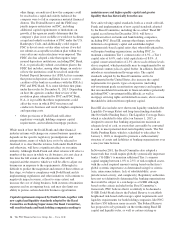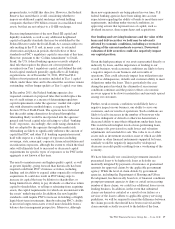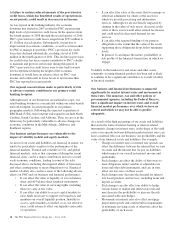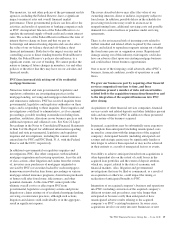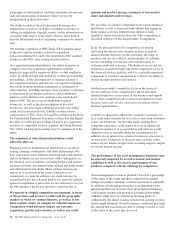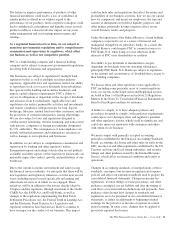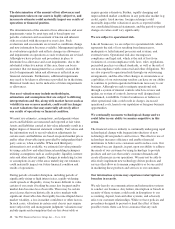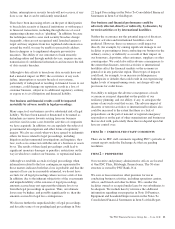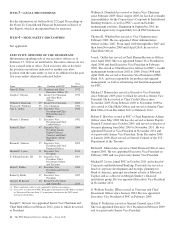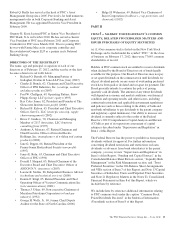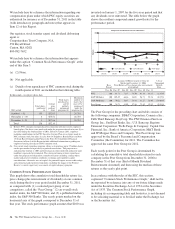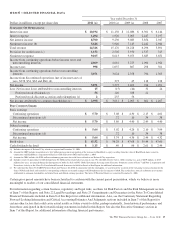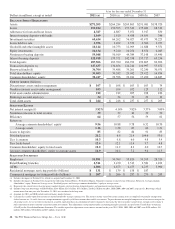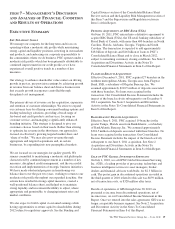PNC Bank 2011 Annual Report Download - page 28
Download and view the complete annual report
Please find page 28 of the 2011 PNC Bank annual report below. You can navigate through the pages in the report by either clicking on the pages listed below, or by using the keyword search tool below to find specific information within the annual report.The monetary, tax and other policies of the government and its
agencies, including the Federal Reserve, have a significant
impact on interest rates and overall financial market
performance. These governmental policies can thus affect the
activities and results of operations of banking companies such
as PNC. An important function of the Federal Reserve is to
regulate the national supply of bank credit and certain interest
rates. The actions of the Federal Reserve influence the rates of
interest that we charge on loans and that we pay on
borrowings and interest-bearing deposits and can also affect
the value of our on-balance sheet and off-balance sheet
financial instruments. Both due to the impact on rates and by
controlling access to direct funding from the Federal Reserve
Banks, the Federal Reserve’s policies also influence, to a
significant extent, our cost of funding. We cannot predict the
nature or timing of future changes in monetary, tax and other
policies or the effect that they may have on our activities and
financial results.
PNC faces increased risk arising out of its residential
mortgage businesses.
Numerous federal and state governmental, legislative and
regulatory authorities are investigating practices in the
mortgage lending, servicing and mortgage-related insurance
and reinsurance industries. PNC has received inquiries from
governmental, legislative and regulatory authorities on these
topics and is responding to these inquiries. These inquiries and
investigations could lead to administrative, civil or criminal
proceedings, possibly resulting in remedies including fines,
penalties, restitution, alterations in our business practices and
additional expenses and collateral costs. See Note 22 Legal
Proceedings in the Notes to Consolidated Financial Statements
in Item 8 of this Report for additional information regarding
federal and state governmental, legislative and regulatory
inquiries and investigations, including the consent orders
entered into by PNC and PNC Bank, N. A. with the Federal
Reserve and the OCC, respectively.
In addition to governmental or regulatory inquiries and
investigations, PNC, like other companies with residential
mortgage origination and servicing operations, faces the risk
of class actions, other litigation and claims from the owners
of, investors in or purchasers of mortgages originated or
serviced by PNC (or securities backed by such mortgages);
homeowners involved in foreclosure proceedings or various
mortgage-related insurance programs; downstream purchasers
of homes sold after foreclosure; title insurers; and other
potential claimants. At this time PNC cannot predict the
ultimate overall cost to or effect upon PNC from
governmental, legislative or regulatory actions and private
litigation or claims arising out of residential mortgage lending,
servicing or reinsurance practices, although such actions,
litigation and claims could, individually or in the aggregate,
result in significant expense.
The issues described above may affect the value of our
ownership interests, direct or indirect, in property subject to
foreclosure. In addition, possible delays in the schedule for
processing foreclosures may result in an increase in
nonperforming loans, additional servicing costs and possible
demands for contractual fees or penalties under servicing
agreements.
There is also an increased risk of incurring costs related to
further remedial and related efforts required by the consent
orders and related to repurchase requests arising out of either
the foreclosure process or origination issues. Reputational
damage arising out of this industry-wide inquiry could also
have an adverse effect upon our existing mortgage business
and could reduce future business opportunities.
One or more of the foregoing could adversely affect PNC’s
business, financial condition, results of operations or cash
flows.
We grow our business in part by acquiring other financial
services companies from time to time, and these
acquisitions present a number of risks and uncertainties
related both to the acquisition transactions themselves and
to the integration of the acquired businesses into PNC
after closing.
Acquisitions of other financial services companies, financial
services assets and related deposits and other liabilities present
risks and uncertainties to PNC in addition to those presented
by the nature of the business acquired.
In general, acquisitions may be substantially more expensive
to complete than anticipated (including unanticipated costs
incurred in connection with the integration of the acquired
company). Anticipated benefits (including anticipated cost
savings and strategic gains) may be significantly harder or
take longer to achieve than expected or may not be achieved
in their entirety as a result of unexpected factors or events.
Our ability to achieve anticipated results from acquisitions is
often dependent also on the extent of credit losses in the
acquired loan portfolios and the extent of deposit attrition,
which are, in part, related to the state of economic and
financial markets. Also, litigation and governmental
investigations that may be filed or commenced, as a result of
an acquisition or otherwise, could impact the timing or
realization of anticipated benefits to PNC.
Integration of an acquired company’s business and operations
into PNC, including conversion of the acquired company’s
different systems and procedures, may take longer than
anticipated or be more costly than anticipated or have
unanticipated adverse results relating to the acquired
company’s or PNC’s existing businesses. In some cases,
acquisitions involve our entry into new businesses or new
The PNC Financial Services Group, Inc. – Form 10-K 19


